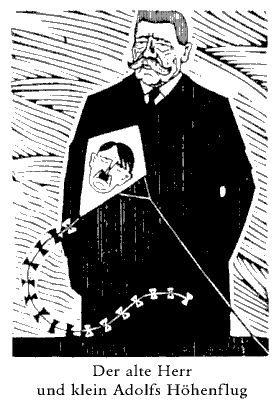- Yg. 1927, No. 40 -
Mr. v. Hindenburg celebrates its 80 today. Birthday. Since he is something like a German national saint since Tannenberg, it will not go off without a little Hindenburg grumble. Even left-sided leaves and persons will probably not be able to escape him. Unfortunately, we have not yet progressed so far in political terms on the one hand and in civic pride on the other that such occasions need not be embarrassing.
Hindenburg is President of the German Republic. Where he is honored as such in an appropriate form, he is not a person but a symbol; and not a Republican, not even the harshest political opponent of the head of state, would have occasion to escape the event or even disturb it. But Hindenburg is also imperial field marshal and black and white and red propaganda figure; Despite all the loyalty to the republic which he has observed since taking over his present office, he has not given up relations with his former position. In particular, he still seems (despite personal aversion) to feel bound by his military duty to the former "supreme warlord"; otherwise he would not have replied to that real Wilhelmine telegram on the day of Tannenberg. And if the birthday of Hindenburg is celebrated with demonstrations of so-called patriotic associations and monarchist flag parades, then one will not be able to expect a Republican to participate. The Reichsbanner black-red-gold is right if it refuses to stand in Berlin next to werewolves and other swastikas trellis.
Even in the completely unfounded, for the initiated almost comical glorification of the person of Hindenburg, no one who knows about the Hindenburg legend will be able to participate. Should the Prussian Prime Minister a. D. Adam Stegerwald not be sufficiently informed about it? He is the author of a greasy Matern article that the provincial press, including the picture of the jubilee garnished with bay leaves, published a long time ago. Hindenburg cannot be “a role model for all of us” in all things; he is not a "great man"; and his services as a military leader are really not exactly undeniable. Stegerwald does it roughly like the wine grower who used to say of a good vintage: “own plant”, and of a bad one: “Our Lord made it grow like this”. He writes of his hero: “He was successful and not proud of it. He has seen misfortune fall upon himself and his cause. . ., and didn't break itself. ”Couldn't one also be tempted to put“ luck ”instead of success and“ failure ”instead of misfortune? The - decisive - end result of the campaign led by Hindenburg was unfortunately the failure, and one does neither honor nor correspond to the historical truth if one declares him to be completely irresponsible for the defeat, even if he himself was robust enough, not for it to break.
With the responsibility of those responsible it is something weird these days. It is based entirely on the above mentioned Weingärtnerfilosofie. If a diplomat, a minister, or a general succeeds, then they worship him, even if the success was more "pig" than merit. (That has always been so.) But if the man has failed, then one does not blame him, even if this failure obviously does not come from "bad luck", but is due to incompetence, stubbornness, arrogance. (It has not always been that way, for such cases you used to have state and military courts or the twine on other occasions.)
The German people, rather a narrow majority of this people, have elected their Hindenburg president after he has prevented the timely peace and lost the war, which for him seems to have been only a great maneuver.
We did not choose him. It would be far from us to insult him, as Ebert has insulted. We are ready to honor him as President of the Republic. But we want to see him perform in a frock coat, not in a general costume. And we refuse to worship him.
1927, 40 Sch.
